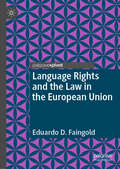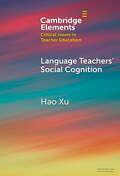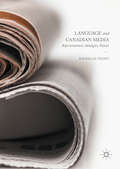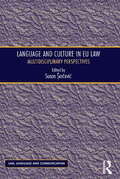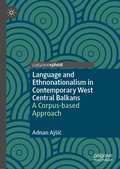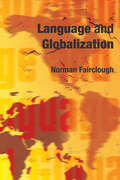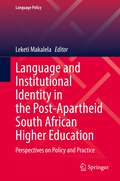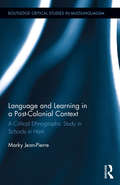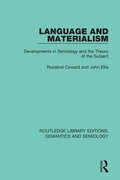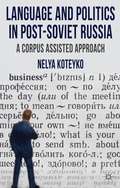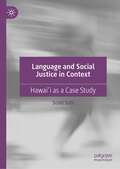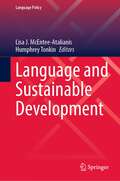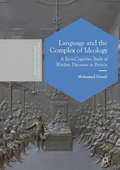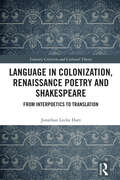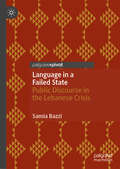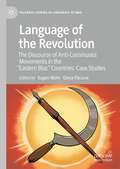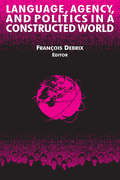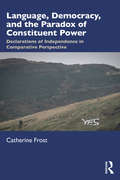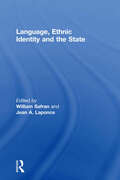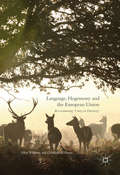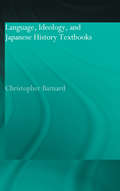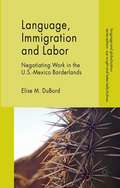- Table View
- List View
Language Rights and the Law in the European Union
by Eduardo D. FaingoldThis book examines the language policies relating to linguistic rights in European Union law and in the constitutions and legal statutes of some European Union member states. In recent years, the European Union has seen an increase in claims for language recognition by minority groups representing a considerable population (such as Catalan in Spain and Welsh in the UK). Additionally, there is a developing situation surrounding the official use of English within the European Union in the aftermath of the Brexit vote. In light of these two contexts, this book focuses on the degree of legal protection afforded to linguistic groups in the European Union. It will be of interest to students and scholars of language policy, EU law, minority languages and sociolinguistics.
Language Teachers' Social Cognition (Elements in Critical Issues in Teacher Education)
by Hao XuThis Element aims to elucidate the theories of social cognition and to delineate their implications for the professional development of language teachers in primary and secondary schools. We first explore the concept of social cognition. The three key dimensions, that is, representation of social reality, social cognitive processing, and social mental abilities, of the social cognition theories are further elaborated with examples closely associated with language teaching and teacher development. We continue with more specific issues such as impression, attitude, emotion, and self-efficacy, which arise and develop as language teachers code, store, and retrieve information from social situations. We then discuss how social cognition influences teacher learning and development as observed and promoted within different social realities, and we end this Element with a call for a social-cognitive perspective on understanding language teachers' learning and development situated in diverse and changing contexts in and out of schools.
Language and Canadian Media
by Rachelle VesseyLanguage Ideologies and Canadian Media explores how French and English Canadian media discuss languages and language issues, which language ideologies predominate in English and French, and whether language ideologies in traditional news media are transferred to new and social media. Using corpus linguistics and discourse analysis and a variety of different datasets ranging from print newspapers to online news, commentary and Twitter, the author argues that language ideologies in Canadian media have a bearing not only on the extent to which Canadian language policies are adopted, but also on the very way that Canadians understand themselves and their place in the nation.
Language and Culture in EU Law: Multidisciplinary Perspectives (Law, Language and Communication)
by Susan ŠarčevićWritten by distinguished legal and linguistic scholars and practitioners from the EU institutions, the contributions in this volume provide multidisciplinary perspectives on the vital role of language and culture as key forces shaping the dynamics of EU law. The broad spectrum of topics sheds light on major Europeanization processes at work: the gradual creation of a neutralized EU legal language with uniform concepts, for example, in the DCFR and CESL, and the emergence of a European legal culture. The main focus is on EU multilingual lawmaking, with special emphasis on problems of legal translation and term formation in the multilingual and multicultural European context, including comparative law aspects and an analysis of the advantages and disadvantages of translating from a lingua franca. Of equal importance are issues relating to the multilingual interpretation of EU legislation and case law by the national courts and interpretative techniques of the CJEU, as well as the viability of the autonomy of EU legal concepts and the need for the professionalization of court interpreters Union-wide in response to Directive 2010/64/EU. Offering a good mix of theory and practice, this book is intended for scholars, practitioners and students with a special interest in the legal-linguistic aspects of EU law and their impact on old and new Member States and candidate countries as well.
Language and Development in Africa
by H. Ekkehard WolffDevelopment is based on communication through language. With more than two thousand languages being used in Africa, language becomes a highly relevant factor in all sectors of political, social, cultural and economic life. This important sociolinguistic dimension hitherto remains underrated and under-researched in 'Western' mainstream development studies. The book discusses the resourcefulness of languages, both local and global, in view of the ongoing transformation of African societies as much as for economic development. From a novel 'applied African sociolinguistics' perspective it analyses the continuing effects of linguistic imperialism on postcolonial African societies, in particular regarding the educational sector, through imposed hegemonic languages such as Arabic and the ex-colonial languages of European provenance. It offers a broad interdisciplinary scientific approach to the linguistic dimensions of sociocultural modernisation and economic development in Africa, written for both the non-linguistically trained reader as much as for the linguistically trained researcher and language practitioner.
Language and Ethnonationalism in Contemporary West Central Balkans: A Corpus-based Approach
by Adnan AjšićThis book uses a specialized corpus of public language-related discourse to investigate links between language ideologies and ethnonationalism in contemporary West Central Balkans. Despite a century and a half of shared linguistic history, the nations making up the central part of former Yugoslavia continue to debate the ownership over the common language, creating much animosity, some legal issues, and often absurd circumstances. At the heart of the ongoing language debate over Central South Slavic is the belief in language as the cornerstone of ethnonational identity and the legitimacy of ethnic groups’ claims to sovereignty. Given a history of conflict and the recent resurgence in extreme ethnonationalism, an understanding of ethnolinguistic contestation in the region is as important as ever. This book will be of interest to social scientists working in fields as diverse as (applied) linguistics, anthropology, media studies, political science, sociology and history, as well as other scholars with an interest in language and society.
Language and Globalization
by Norman FaircloughLanguage and Globalization explores the effects of language in the processes of globalization. Norman Fairclough adopts the approach of combining critical discourse analysis with cultural political economy to develop a new theory of the relationship between discourse and other dimensions of globalization. Using examples from a variety of countries such as the USA, Britain, Romania, Hungary and Thailand, Language and Globalization shows how the analysis of texts can be coherently integrated within political economic analysis. Fairclough incorporates topical issues such as the war on terror and the impact of the media on globalization into his discussion. Areas covered include: globalization and language: review of academic literature discourses of globalization the media, mediation and globalization globalization, war and terrorism. This book will be of interest to students and researchers in applied linguistics, language and politics and discourse analysis.
Language and Institutional Identity in the Post-Apartheid South African Higher Education: Perspectives on Policy and Practice (Language Policy #27)
by Leketi MakalelaThis book examines the intersections between education, identity formation, and language in post-apartheid South Africa with specific attention to higher education. It does so against the backdrop of the core argument that the sector plays a critical role in shaping, (re)producing and perpetuating sectoral, class, sub-national and national identities, which in turn, in the peculiar South African setting, are almost invariably analogous with the historical fault lines determined and dictated by language as a marker of ethnic and racial identity. The chapters in the book grapple with the nuances related to these intersections in the understanding that higher education language policies – overt and/or covert – largely structure institutional cultures, or what has been described as curriculum in higher education institutions. Together, the chapters examine the roles played by higher education, by language policies, and by the intersections of these policies and ethnolinguistic identities in either constructing and perpetuating, or deconstructing ethnolinguistic identities upon which the sector was founded. The introductory chapter lays out the background to the entire book with an emphasis on the policy and practice perspectives on the intersections. The middle chapters describe the so-called “White Universities”, “Black Universities” and “Middle-Man Minorities Universities”. The final chapter maps out future directions of the discourses on language and identity formation in South Africa’s higher education.
Language and Learning in a Post-Colonial Context: A Critical Ethnographic Study in Schools in Haiti (Routledge Critical Studies in Multilingualism)
by Marky Jean-PierreThis book explores the social, political, and historical forces that mediate language ideology and practices in post-colonial education and how such ideology and practices influence students’ academic achievement. Jean-Pierre provides empirical evidence that a relationship exists between language practices and school underperformance. He takes Haiti as the focus of study, finding that students and teachers experience difficulty constructing knowledge in a setting in which the language they speak at home (Creole) differs from the language of instruction (French). The research is based on ethnographic data collected in classrooms in both private and public school settings in addition to different sectors of the society (e.g. state and private institutions).
Language and Materialism: Developments in Semiology and the Theory of the Subject (Routledge Library Editions: Semantics and Semiology #5)
by John Ellis Rosalind CowardFirst published in 1977, this book presents a comprehensive and lucid guide through the labyrinths of semiology and structuralism — perhaps the most significant systems of study to have been developed in the twentieth century. The authors describe the early presuppositions of structuralism and semiology which claim to be a materialist theory of language based on Saussure’s notion of the sign. They show how these presuppositions have been challenged by work following Althusser’s development of the Marxist theory of ideology, and by Lacan’s re-reading of Freud. The book explains how the encounter of two disciplines — psychoanalysis and Marxism — on the ground of their common problem —language — has produced a new understanding of society and its subjects. It produces a critical re-examination of the traditional Marxist theory of ideology, together with the concepts of sign and identity of the subject.
Language and Politics in Post-Soviet Russia
by Nelya KoteykoLanguage and Politics in Post-Soviet Russia critically examines the uses of language in post-Soviet media and political texts between 1998 and 2007. It will be of interest to academics and researchers in the fields of media studies, discourse analysis, corpus linguistics, and scholars in Russian Studies.
Language and Revolution: Making Modern Political Identities (Cummings Center Series #Vol. 16)
by Igal HalfinThis work examines the role of language in forging the modern subject. Focusing on the idea of the "New Man" that has animated all revolutionaries, the present volume asks what it meant to define oneself in terms of one's class origins, gender, national belonging or racial origins.
Language and Social Justice in Context: Hawaiʻi as a Case Study
by Scott SaftThis book builds on recent research exploring the intersection between language and social justice, using the multilingual context of Hawai'i as a case study. The author offers a discourse-centered approach, providing analyses of actual instances of language use, and argues that the wide range of languages in Hawai'i - Hawaiian, Pidgin, Japanese, Chinese, Tagalog, Ilocano, Marshallese, and Chuukese, as well as the phenomenon of language mixing - all have a significant contribution to make to society. The book also draws on language acquisition research demonstrating positive long-term effects of exposure to multiple languages, and makes the case for educational approaches that foster multilingual abilities among the young members of society. This book will be relevant for academics interested in the intersection of language and social justice and languages in Hawaiʻi, but it should also be of interest to undergraduate and especially graduate students in sociolinguistics, language revitalization and language documentation, discourse analysis, applied linguistics, and pragmatics.
Language and Sustainable Development (Language Policy #32)
by Humphrey Tonkin Lisa J. McEntee-AtalianisThis book addresses the importance of language in matters of sustainability and incorporating such concerns in implementing the UN’s Sustainable Development Goals (SDGs). Sustainable language policy must aim to include all groups, including language minorities and marginalized populations, such as refugees and aid recipients, in conditions that allow for their inclusion in making and implementing policy. The book brings together nine studies covering such topics as language and digital resources, sustainable and inclusive multilingual education, national language policy, and language in peacekeeping operations. A final chapter addresses the crucial intersection between sociolinguistics and economics, and the implications of this for development and the SDGs.
Language and the Complex of Ideology: A Socio-Cognitive Study of Warfare Discourse in Britain (Postdisciplinary Studies in Discourse)
by Mohamed DouifiThis book undertakes a systematic analysis of the workings of ideology in discourse, using an interdisciplinary approach that links language, cognition and society. Through examination of two corpora - a collection of British newspaper articles and a set of political speeches - the author examines Britain's involvement in the Iraq War (2003), and critically assesses the language practices which constructed a pro-war ideology under Tony Blair's premiership. Drawing on a constellation of concepts from van Dijk's socio-cognitive model, this book carries out both qualitative and quantitative analyses and conceptualises discourse as a nonlinear, highly discursive and socio-cognitive phenomenon. This innovative work will appeal to students and scholars of Cognitive Linguistics, Quantitative Linguistics, Social Constructivism, Critical Discourse Analysis, Political Sciences and Communication Studies.
Language death
by David CrystalThe rapid endangerment and death of many minority languages across the world is a matter of widespread concern, not only among linguists and anthropologists but among all interested in the issues of cultural identity in an increasingly globalized culture. A leading commentator and popular writer on langauge issues, David Crystal asks the fundamental question, "Why is language death so important?", reviews the reason for the current crisis, and investigates what is being done to reduce its impact. By some counts, only 600 of the 6,000 or so languages in the world are "safe" from the threat of extinction. By some reckonings, the world will, by the end of the twenty-first century, be dominated by a small number of major languages. Language Death provides a stimulating and accessible account of this alarming trend, which, like the large-scale destruction of the environment, is both peculiarly modern and increasingly global. Language Death includes intelligent argument and moving descriptions of the decline and demise of particular languages, as well as practical advise for anyone interested in pursuing the subject further. David Crystal is a leading authority on language, and author of many books, including most recently Language and the Internet, (Cambridge, 2001). He is author or editor of several other books with Cambridge, including the Cambridge Encyclopedia of Language (1997), Cambridge Encyclopedia of the English Language (1995), English as a Global Langauge (1997), Language Death (2000); and Words on Words (University of Chicago, 2000). An internationally renowned writer, journal editor, lecturer and braodcaster, he received an Order of the British Empire in 1995 for his services to the English language.
Language in Colonization, Renaissance Poetry and Shakespeare: From Interpoetics to Translation (Literary Criticism and Cultural Theory)
by Jonathan Locke HartLanguage is the central concern of this book. Colonization, poetry and Shakespeare – and the Renaissance itself – provide the examples. I concentrate on text in context, close reading, interpretation, interpoetics and translation with particular instances and works, examining matters of interpoetics in Renaissance poetry and prose, including epic, and the Hugo translation of Shakespeare in France and trying to bring together analysis that shows how important language is in the age of European expansion and in the Renaissance. I provide close analysis of aspects of colonization, front matter (paratext) in poetry and prose, and Shakespeare that deserve more attention. The main themes and objectives of this book are an exploration of language in European colonial texts of the “New World,” paratexts or front matter, Renaissance poetry and Shakespeare through close reading, including interpoetics (liminality), translation and key words.
Language in a Failed State: Public Discourse in the Lebanese Crisis
by Samia BazziThis book examines public, political and media discourse in the context of failed states using Lebanon, a country torn by wars and political-financial corruption, as a contemporary case study. Using critical discourse analysis (CDA), the author brings political and economic theories into dialogue with socio-linguistics to argue that public discourse in a failed state not only plays a role in that collapse but is a key presenting symptom of social disintegration. Through CDA, the book makes this phenomenon visible, and contributes to existing definitions of the concept “failed” or “fragile” state. In addition, the qualitative data and analysis provided offer a tool to assess a state’s vulnerability to collapse. The book also expands the sociolinguistic model to eavesdrop on the zeitgeist of the nation in order to examine the degrees of social cohesion, sectarianism and bonding. This book will be of interest to discourse analysts, journalists, politicians, policy-makers, and economists.
Language of the Revolution: The Discourse of Anti-Communist Movements in the “Eastern Bloc” Countries: Case Studies (Palgrave Studies in Languages at War)
by Eugen Wohl Elena PăcurarThis edited book fills a void in the existing research concerning anti-communist movements in Central and Eastern Europe, outlining the linguistic implications of the cultural, social and political metamorphoses brought about by the (change of) regime. The authors included in this volume approach the topic from a variety of perspectives, but, ultimately, focus on language seen as a fundamental tool for simultaneously subjugating and liberating, concealing and revealing truth, discouraging dissidence and fostering revolt. Readers are invited to discover the linguistic implications of the many shapes and forms that the 1989 anti-communist revolutions took. Equally interesting are the investigations of the revolution aftermath, in the first years of transition to democracy. Perceived as a whole throughout the Cold War (1947-1991), the so-called "Eastern Bloc" managed to reveal its heterogeneity, the singularity of each of its comprising states and the multitude of its internal contrasts, most vividly perhaps, in the manifold manifestations of the 1989 anti-communist fight. This book will be of interest to academics and researchers from various fields, including history, (socio)linguistics, political studies, and conflict studies.
Language, Agency, and Politics in a Constructed World
by Francois DebrixLanguage matters in international relations. Constructivists have contributed the insight that global politics is shaped by the way agents narrate history and produce discourses about themselves and about the world. This insight has induced a profound reexamination of assumptions in the study of international relations. The contributors to this volume examine (Part I) the critical linguistic/discursive techniques of postmodernists and constructivists, and apply them (Part II) to international relations.
Language, Democracy, and the Paradox of Constituent Power: Declarations of Independence in Comparative Perspective
by Catherine FrostIn this book, Catherine Frost uses evidence and case studies to offer a re-examination of declarations of independence and the language that comprises such documents. Considered as a quintessential form of founding speech in the modern era, declarations of independence are however poorly understood as a form of expression, and no one can completely account for how they work. Beginning with the founding speech in the American Declaration, Frost uses insights drawn from unexpected or unlikely forms of founding in cases like Ireland and Canada to reconsider the role of time and loss in how such speech is framed. She brings the discussion up to date by looking at recent debates in Scotland, where an undeclared declaration of independence overshadows contemporary politics. Drawing on the work of Hannah Arendt and using a contextualist, comparative theory method, Frost demonstrates that the capacity for renewal through speech arises in aspects of language that operate beyond conventional performativity. Language, Democracy, and the Paradox of Constituent Power is an excellent resource for researchers and students of political theory, democratic theory, law, constitutionalism, and political history.
Language, Ethnic Identity and the State
by William Safran and Jean A. LaponceThis new study powerfully asserts the pivotal importance of the interplay between language and ethnicity, which is often underestimated as a component for political stability. These leading scholars present five key case studies of South Africa, Algeria, Canada, Latvia and Senegal. All five countries are multilingual nations where language has been a central political issue that has challenged their unity and stability.These studies are underpinned by two general, comparative and theoretical discussions, which analyse how scholars consider social class and economic factors to be the primary sources for political cohesion or of malcontent with the system and the new avenues opened by a focus on issues of langauge. This book will be of great interest to all students and scholars of linguistics, language, politics and sociology. This is a special issue of the leading journal Nationalism and Ethnic Politics.
Language, Hegemony and the European Union
by Glyn Williams Gruffudd WilliamsThis book critically examines the European Union's "Unity in Diversity" mantra with regard to language. It uses a theoretical framework based on hegemony both as a system and as a relationship. Operating within sociolinguistics, the book replaces the notion of ideology in poststructuralist thought with that of hegemony. The authors argue that forging unity across language communities contradicts the tenets of classical liberal theory. Global neo-liberalism influences this orthodoxy, shifting the parameters of power and political control. Over nine chapters, the authors cover topics such as globalization and social change, justice, governance and education. The book will be of interest to sociolinguists, political scientists, sociologists, as well as scholars of language and globalization and European studies.
Language, Ideology and Japanese History Textbooks
by Christopher BarnardThe Japanese history textbook debate is one that keeps making the news, particularly with reference to claims that Japan has never 'apologised properly' for its actions between 1931 and 1945, and that it is one of the few liberal, democratic countries in which textbooks are controlled and authorised by the central government. There are frequent protests, both from within Japan and from overseas, that a biased, nationalistic history is taught in Japanese schools. This is the first time that all the authorised textbooks currently in use have been analysed using a critical discourse that is anchored firmly in the theory of 'language within society', elucidating the meanings and associated ideologies created by the language of the textbooks.
Language, Immigration and Labor
by Elise M. DubordThis book explores dominant ideologies about citizenship, nation, and language that frame the everyday lives of Spanish-speaking immigrant day laborers in Arizona. It examines the value of speaking English in this context and the dynamics of intercultural communication in fast-paced job negotiations.
